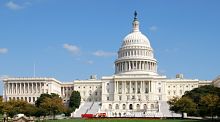
Swiss bank UBS AG will to pay US$19.5 million to settle with U.S. regulators over allegations of deficient disclosure in complex structured products offered by the firm.
The Washington, D.C.-based U.S. Securities and Exchange Commission (SEC) announced on Tuesday that UBS AG has agreed to settle charges that it made misleading statements in offering materials for structured notes that were linked to a proprietary foreign exchange (FX) trading strategy.
The case is its first involving misstatements and omissions by an issuer of structured notes, the SEC says, which despite being relatively complex are often sold to relatively unsophisticated retail investors.
Without admitting or denying the SEC’s findings, UBS agreed to: cease and desist from committing or causing any similar future violations; pay disgorgement and prejudgment interest of US$11.5 million; distribute US$5.5 million of the disgorgement funds to investors in the notes to cover the total amount of investor losses; and pay a civil monetary penalty of US$8 million.
UBS, one of the largest issuers of structured notes, agreed to settle the SEC’s charges that it misled U.S. investors in notes tied to the V10 Currency Index with Volatility Cap. The notes’ offering documents falsely stated that the investment relied on a “transparent” and “systematic” currency trading strategy using “market prices” to calculate the financial instruments underlying the index, the SEC says. However, the regulator adds that undisclosed hedging trades by UBS reduced the index price by about 5%.
According to the SEC’s order, UBS didn’t have an effective policy for ensuring that those preparing the offering documents for the structured notes were aware that UBS employees in Switzerland were engaging in hedging that could have a negative impact on the price inputs used to calculate the V10 index. In addition, the firm did not disclose that it took unjustified markups on hedging trades, engaged in hedging trades with non-systemic spreads, and traded in advance of certain hedging transactions. As well, UBS did not disclose that its traders added spreads to the prices of hedging trades, largely at their discretion. The SEC found that the undisclosed markups and spreads on the hedging transactions depressed the V10 index by approximately 5%, causing investor losses of approximately US$5.5 million.
“This first-of-its-kind case involving misstatements and omissions by a structured notes issuer shows that the SEC continues its commitment to pursue wrongdoing across the securities industry in order to better protect investors,” said Mary Jo White, SEC chairwoman, in a statement. “It is critical that large global financial institutions have and implement policies and procedures designed to ensure that all facts relevant to investors are made known to individuals responsible for disclosures.”
“This case demonstrates the importance of being truthful in offering materials to be used in the offer and sale of structured notes to retail investors,” added Andrew Ceresney, director of the SEC’s division of enforcement. “We will remain focused on protecting investors who are not in a position to protect themselves by virtue of their limited access to information, the complexity of the product, or both.”